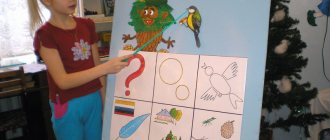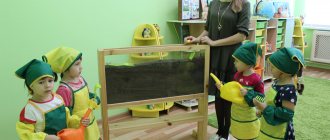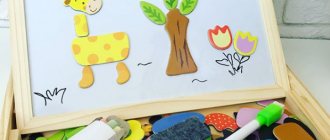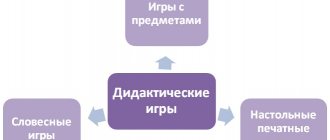Most often, healthy children pronounce their first words at about one year of age. If this does not happen, many parents begin to sound the alarm. However, experts in the field of early development have concluded that the initiation of speech is an individual process for which there is no clear age period. Studies of speech development show that the appearance of speech in a child depends both on the maturation of certain parts of the brain and on the environment in which the child grows. Knowing the characteristics of their child, parents can create a favorable environment for him and help overcome difficulties in the development of your baby's speech.
Speech development at an early age
Sometimes we mistake baby talk for “real” words. A child under one year old tries to repeat the speech of an adult in his own language, often understandable only to his mother. Already a six-month-old baby uses gestures and individual sounds to indicate his needs. Also at this age, the child learns to combine vowels and consonants when pronouncing syllables.
The process of speech development itself is not systematic in children of early and preschool age; very often one can observe leaps in speech development. All children begin to speak at different times. By the age of one year, some children can already pronounce up to 15 separate words. And according to the calculations of child psychologist S. Buller, by the age of 1.5 years, a child’s vocabulary can reach 232 words. At the same time, there are healthy children who at the age of two do not speak a word. Such “silent people” can suddenly begin to speak in whole phrases, catching up and ahead of their peers.
To get a silent child to talk and stimulate the development of his speech, you need to voice your actions, encourage dialogue with the help of questions, listen with interest and try to understand the baby’s answers. Then you will certainly hear that cherished first word.
Preparing a preschooler for reading and writing
Parents strive to teach their preschooler to read and write, but it is not recommended to do this on their own, because... It is required to follow a special teaching methodology. Teachers in kindergartens and development centers provide preparation for school.
Teachers teach children not letters, but sounds on which syllables and then words are built. Particular attention is paid to phonemic hearing and sound pronunciation.
The family plays an important role in learning to read and write. Parents should strive to instill in their children a love of books by their own example, and together with their children, build a home library. There should be literate speech in the house without filler words.
The main form of speech development at home is meaningful conversation. By communicating, family members not only enrich children's vocabulary, but also create a favorable atmosphere for emotional, cognitive and social development.
Stages of child speech development
As we have already said, the trajectories of speech development are individual for each child, and therefore psychologists and other specialists in the field of early development do not establish clear standards for speech development in children.
It is important to note that an indicator of speech development is not only the number of sounds and words that a child uses to communicate, but also his passive vocabulary, that is, those words that the child understands. The passive vocabulary is always larger than the active one, so if the child does not speak, but understands your speech, there is most likely no reason to worry.
Speech skills characteristic of the conditional norm in early and junior preschool age are presented in the table.
| Age | Speech development |
| 1-3 months | Scream. |
| 3-6 months | Humming – drawn-out sounds (“a-gu”, “a-gy”, “bu-u”, etc.). |
| 4-5 months | Squealing, laughter. Humming in various intonations. |
| 6 months | Babbling (syllables “ma”, “ba”). |
| 7-8 months | Increasing the number of pronounced sounds, onomatopoeia (“woof-woof”, “pee-pee”), understanding simple words and requests. |
| 9-11 months | Simple words (“mother”, “baba”, “give”, “na”). |
| 1–1.5 years | Simple two-word phrases (“give yum-yum”, “there’s a pussy there”). |
| 2-3 years | Phrases of 2-3 words, the appearance of question words. Naming famous colors, objects, body parts. Learning simple poems, telling short stories. |
| 34 years | Phrases of 4 or more words. A stranger can understand a child’s speech. |
If there is a strong discrepancy between the child’s speech development level and age norms, it is advisable to seek advice from a specialist (neurologist, speech therapist, psychologist) in order to exclude a delay in psycho-speech development.
Symptoms of delayed speech or mental development of a child may include the following:
- Problems with chewing and swallowing food;
- Constantly open mouth, excessive salivation;
- Refusal to communicate;
- Lack of eye contact;
- Slurred speech, “porridge in the mouth”;
- Difficulties in understanding speech (does not respond to requests);
- Inappropriate behavior.
Timely contact with specialists allows you to identify the cause of the child’s delayed speech development as early as possible and develop an individual plan for correctional and developmental classes.
Helping a 6-year-old child who speaks poorly
Corrective work with such children is carried out depending on the diagnosis made by specialists. If desired, parents can significantly increase the effectiveness of the corrective influence of a speech therapist, speech pathologist and psychologist if they follow all the recommendations given by specialists.
Some techniques for working with children with speech problems:
- offer to select similar and opposite words (synonyms and antonyms) to the objects around him or to the pictures;
- we learn to classify objects - what is round, sweet, heavy, blue, etc.; play the game “Living-non-living”, “Edible-inedible”;
- make riddles about the objects around them, come up with them yourself or together with your child;
- practice coming up with words on the topic “wide-narrow”, “one-many”;
- invite him to make a sentence of 2 words, then increase this sentence to 3 words, etc.;
- share your impressions of what you saw in the theater, on an excursion, in a museum, talk on walks about the objects that surround you, about the seasons and their signs;
- look at the pictures, try to make sentences based on them first, then a story;
- Read the best examples of children's fiction to your child more often, talk about the content of the works;
- invite him to highlight words that contain a given sound, and come up with his own words for this sound;
- From time to time, recite familiar poems, sayings, and simple sayings together to practice subtle movements of the lips and tongue.
Timely diagnosis and qualified correctional work will help to correct the speech defects of a preschooler in a timely manner and prepare him for studying in a comprehensive school.
Sign up for a consultation. The center's children's speech therapist and psychologist will determine the individual causes of delayed speech development, give recommendations for correction, and also draw up a plan for classes in the center and at home. This system of work will make the correctional route the most effective and will successfully harmonize the baby’s development process.
First word
What should a baby's first word be? Early development specialists believe that it does not necessarily have to be familiar and familiar to us. Experts tend to consider any recognizable set of sounds that denote a person, object or action (for example, “baka” instead of “dog”, “ka” instead of “porridge”) as a peculiar word.
Usually children say their first word at the age of 8-9 months. Most often these are onomatopoeias or words of two repeated syllables.
How to understand that a child said exactly a word, and not just a set of sounds? If the child’s statements are repeated under the same circumstances, even if you cannot understand them, rest assured that your baby said a word, his speech apparatus is simply not yet developed enough to pronounce this word legibly. To prevent your child’s speech development from slowing down, you should not speak to your baby in his “baby” language. If your child says “beep beep” while pointing at a car, say, “That’s right, it’s a car.” While walking in the yard, ask your child to show you the car. And to translate the word “car” from a child’s passive vocabulary to an active one, point to the car and ask: “What is that?” Then your baby will certainly learn a new word and learn to pronounce it correctly.
There is a myth that a child’s first word must be the word “mother.” Indeed, some children say “mom” as early as 4-5 months. Also, even before one year old, children can say “Lala”, “Baba”, etc. These are all easy-to-pronounce words that are formed from the repeated babble of a child. The words that are easy to pronounce come first.
Possible causes of speech disorders
If a child speaks poorly at the age of 6, the main causes of speech impairment are diagnosed: dyslalia, motor alalia, sensory alalia and dysarthria.
Only a qualified specialist - a pediatric neurologist, psychoneurologist, speech therapist - can make a diagnosis based on the results of the examination. They will also offer recommendations on medication and pedagogical correction of speech defects.
Dislalia
Dyslalia means a violation of sound pronunciation, which is based on a defect in the anatomy of the organs of articulation, reversible disorders of the cerebral cortex (minimal cerebral dysfunction), and social neglect.
Possible defects of the articulation organs:
- short frenulum of the tongue;
- thick lips;
- massive tongue;
- too narrow language;
- high “Gothic” palate;
- low and wide palate;
- malocclusion;
- distances between teeth;
- sparse or small teeth.
Dyslalia at the age of 6 can be diagnosed in children growing up in a bilingual family, imitating the incorrect speech of loved ones, in socially disadvantaged families, as well as in children living in a situation of overprotection.
Dyslalia refers to the replacement, omission or distortion of sound. In order to eliminate dyslalia in six-year-old children, corrective classes with a speech therapist are needed, and possibly correction of the bite by an orthodontist.
Motor alalia
If a 6-year-old child has a very small vocabulary, his first words appeared late, he rearranges and shortens words and syllables, perhaps he has motor alalia.
This is a disease in which children understand the speech of those around them, but cannot construct their own full-fledged statement. Its cause is a violation of the maturation of the speech zones of the brain, their damage as a result of birth trauma, or pathologies of intrauterine development.
Manifestations of motor alalia at 6 years of age:
- distortion of words, replacement with others that are similar in meaning;
- violation of word agreement by gender, case and number;
- slower selection of words in statements;
- repetition of the same words and sound combinations.
There are also deviations from the norm in the movements and behavior of such children; they lack dexterity and have poorly developed fine motor skills. Attention, memory, and intellectual activity suffer, and the desire to understand the world is reduced.
See more about motor alalia - causes, symptoms, diagnosis, treatment and prognosis.
Sensory alalia
Manifestations of sensory alalia are similar to those of motor alalia. The main difference in the structure of the defect is that children do not understand speech addressed to them and therefore have difficulty forming their own statements. Their speech develops late; it is replete with irregular words that do not change according to gender, case and number. Children are slow and inactive, and have severe motor impairment.
Diagnosing sensory alalia at the age of 6 is not easy - the baby may not understand speech addressed to him at all, and may not even respond to his own name.
Manifestations of this defect are sometimes wrongly confused with autism, mental retardation, and mental retardation. In general, six-year-old children with sensory alalia are active in terms of speech, but may become irritated and show negativity due to the fact that they cannot fully communicate with others.
Dysarthria
Most often, 6-year-old children who speak poorly suffer from dysarthria. This speech disorder is associated with damage to parts of the brain that occurs during intrauterine development, childbirth, after diseases of the central nervous system, as a result of chromosomal abnormalities.
The speech of a child with erased dysarthria is difficult to understand for others, it is unclear, and sound pronunciation is blurred. The voice is quiet, but can also be sharp, the pace of speech is accelerated or slowed down. Such children do not like to chew solid food, find it difficult to cut with scissors, draw, perform movements to music, or maintain balance.
First phrases
An important stage in speech development is the acquisition of phrasal speech in preschool age. By the age of 1.5–2 years, simple two-word phrases usually appear in speech. The vocabulary is actively increasing, verbs, prepositions, and adverbs are being used. At 2-3 years old, children begin to use adjectives. The age of 3-5 years is often called the age of “why”. During this period, children are interested in everything, eagerly learn about the world around them and, accordingly, ask adults many questions.
If at this age the child does not have phrasal speech, you should consult a specialist. Developmental activities will help fill in the gaps and lay the foundation for the further development of your baby’s speech.
To develop your child’s phrasal speech, you can do the following:
- Read books to your child that are appropriate for his age;
- Look at the pictures;
- Listen to music with your child, sing songs, dance;
- Answer the child’s questions and support his research interest;
- Provide the child with new impressions, discuss what he sees;
- Monitor the purity of your own speech;
- Encourage communication with children.
There are also a number of games and exercises that contribute to the development of a child’s speech. These include:
- Games to develop fine motor skills;
- Articulation gymnastics;
- Finger gymnastics.
You can get acquainted with these and many other useful exercises in classes at. The good thing about these games is that you can play them at home yourself. They not only have a beneficial effect on speech development, but also develop the baby’s attention, memory, and thinking. Perform only those exercises that evoke positive emotions in you and your child, do it unobtrusively and with genuine interest. The most important thing is to enjoy communicating with each other.
Exercises for the development of coherent speech in children 6-7 years old
Phrasal speech develops by imitation. The child must hear correct, competent, well-delivered speech, which he will take as a model. Children acquire their native language unconsciously, through listening.
Reading high-quality literature, listening to audio plays and audio books, watching theatrical performances have a beneficial effect on the richness and content of children's speech. To expand your speaking capabilities, it is not necessary to conduct special developmental classes.
You can develop coherent speech in everyday situations:
- Read books, discuss what you read.
- Learn poetry.
- Remember in small details the road from home to kindergarten.
- Ask to retell the plot of the cartoon you watched.
- Offer to fantasize on the topic “If I were a wizard...”.
- Come up with a story together, write it down and draw illustrations.
- Consider wimmelbooks - books without words, with many drawings in which objects and people are drawn in detail. Wimmelbook is an excellent simulator for the development of all speech functions. The child will be able to compose stories and stories based on the illustrations.
How to develop thinking
The development of cognitive mental processes is a mandatory component of speech therapy classes. Thinking and speech are inextricably linked. Speech is the main tool of thinking. With the development of logical thinking, the child develops the ability to compose coherent sentences, formulate thoughts and conclusions.
Games for developing thinking:
- The child is offered pictures depicting various objects that need to be combined into semantic groups.
- A series of pictures is selected in which one of the objects is redundant. You need to find this item and explain your choice. Another version of the task: the teacher reads the words, the children, having heard the odd one out, clap their hands.
- The teacher names an adjective, the children find an antonym for it.
- An adult thinks of an object and describes its characteristics. The children's task is to guess the object.
How to develop memory
Memory is a person’s ability to perceive and remember information for subsequent reproduction. Without it, speech development is impossible. Verbal-logical memory is the psychological basis of speech.
Exercises for speech development.
Memory development exercises:
- Game “What has changed?” There are 2 similar pictures with different details. The child needs to find the differences.
- An image of several objects is offered, the child needs to look at them and draw from memory.
- The teacher throws a ball to the children and names a generalizing word (transport, animal, clothing, etc.). The child catches the ball and names the appropriate object.
- The teacher names a profession, the children describe the verbs that relate to it.
- An adult taps the rhythm with a pencil. Children repeat the rhythm, gradually increasing the tempo.
conclusions
Speech development is a complex process, and it occurs differently for each child. Experts identify several stages of speech development in children, each of which involves the development of new speech skills. These stages do not have strict age limits. The transition from one stage of speech development to another can occur either smoothly or abruptly.
If the baby is healthy, speech development occurs naturally when you communicate with him and talk about the world around him. Your child watches you and tries to copy your speech, so it is important to monitor the correctness of your own speech. It is necessary to create a favorable environment for the child in which he can fulfill the needs characteristic of his age. You can offer your child games to develop fine motor skills, as well as introduce them to articulation and finger gymnastics.
If you feel that your baby is experiencing difficulties and the development of his speech is far behind the conventional boundaries of the norm, you need to consult with a specialist to rule out health problems and delayed psycho-speech development.
Norms of speech development
By this age the child:
- distinguishes sounds, selects the desired phoneme in a word;
- can pronounce words with complex syllable structure and consonant clusters;
- can determine how many syllables are in a word;
- uses complex sentences in speech;
- uses prepositions in his speech;
- masters the skill of coordinating words in a sentence;
- masters all methods of word formation;
- understands speech addressed to him;
- understands the hidden meaning of works of art;
- uses more and more words in coherent speech;
- without the help of an adult, composes descriptive stories, retells fairy tales and other works;
- can provide logical arguments to support a point of view or answer to a question;
- uses constructions with the conjunction “A”;
- understands logical and grammatical structures.
By the age of 7 years, children with normal speech development master the listed skills in full.











